I have an application that logs whatever the user press, but when I press special characters like ´ with a, to get á, I get ´´a; same thing when I want to get à, then i get ``a, so all special characters get typed twice and then the regular character get typed after.
I have searched for ever and can't find anything really. But I have noticed that the problem is in the ToAscii method , without that the characters are typed correctly.
public string GetString(IntPtr lParam, int vCode)
{
try
{
bool shift = Keys.Shift == Control.ModifierKeys || Console.CapsLock;
string value = "";
KeyboardHookStruct MyKeyboardHookStruct =
(KeyboardHookStruct)Marshal.PtrToStructure(
lParam, typeof(KeyboardHookStruct));
byte[] keyState = new byte[256];
byte[] inBuffer = new byte[2];
DllClass.GetKeyboardState(keyState);
var ascii=
DllClass.ToAscii(
MyKeyboardHookStruct.vkCode,
MyKeyboardHookStruct.scanCode,
keyState, inBuffer, MyKeyboardHookStruct.flags
);
if (ascii == 1)
{
char key = (char)inBuffer[0];
if ((shift) && Char.IsLetter(key))
key = Char.ToUpper(key);
value = key.ToString();
}
return value;
}
catch (Exception)
{
return "";
}
}
Am I missing something or doing something wrong? All other characters are working perfectly but it's the special characters that is coming as double chars.
EDIT:
Trying with ToUnicode instead.
[DllImport("USER32.DLL", CharSet = CharSet.Unicode)]
public static extern int ToUnicode(
uint virtualKey, uint scanCode, byte[] keyStates,
[MarshalAs(UnmanagedType.LPArray)] [Out] char[] chars,
int charMaxCount, uint flags);
public string GetString(IntPtr lParam, int vCode)
{
try
{
bool shift = Keys.Shift == Control.ModifierKeys || Console.CapsLock;
string value = "";
KeyboardHookStruct MyKeyboardHookStruct =
(KeyboardHookStruct)Marshal.PtrToStructure(
lParam, typeof(KeyboardHookStruct));
byte[] keyState = new byte[256];
byte[] inBuffer = new byte[2];
char[] chars = new char[2];
DllClass.GetKeyboardState(keyState);
int val = 0;
val = ToUnicode(
(uint)MyKeyboardHookStruct.vkCode,
(uint)MyKeyboardHookStruct.scanCode,
keyState, chars, chars.Length, 0
);
val = ToUnicode(
(uint)MyKeyboardHookStruct.vkCode,
(uint)MyKeyboardHookStruct.scanCode,
keyState, chars, chars.Length, 0
);
if (val == 1)
{
char key = (char)chars[0];
if ((shift) && Char.IsLetter(key))
key = Char.ToUpper(key);
value = key.ToString();
}
return value;
}
catch (Exception)
{
return "";
}
}
Someone PLEASE help me, I really need to figure this out =/.
EDIT:
int val = -1;
if (IsDeadKey((uint)vCode))
{
while (val == -1)
{
val = ToUnicode(
(uint)MyKeyboardHookStruct.vkCode,
(uint)MyKeyboardHookStruct.scanCode,
keyState, chars, chars.Length, 0
);
}
}
else
val = ToUnicode(
(uint)MyKeyboardHookStruct.vkCode,
(uint)MyKeyboardHookStruct.scanCode,
keyState, chars, chars.Length, 0
);
So now I have tried calling the ToAscii or ToUnicode a couple of times to flush the real character but without success. Am I doing it wrong?
Like for ASCII, first call for ´ I get -1, so I call it again, then I get 1; and then I press like a, to get á, but then I only get a. Same thing if I use ToUnicode twice after each other, I get just a instead of á, and so on ...
